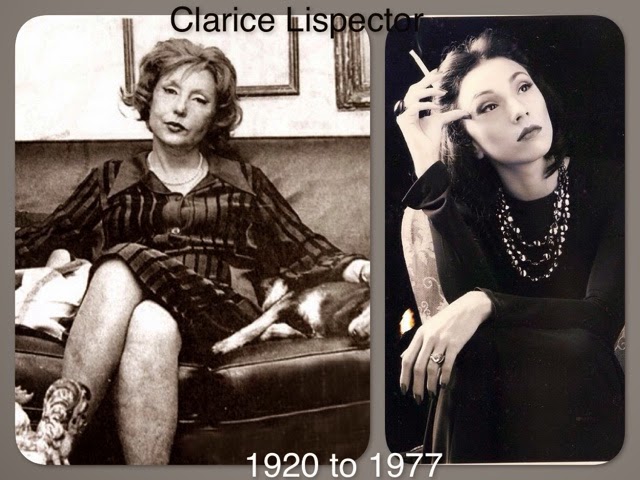Tuesday, March 31, 2015
"Unholy Living and Half Dying" by Sean O'Faoláin. (1952)
Monday, March 30, 2015
"Gambara" by Honore de Balzac (1837, A Short Story, A Component of The Human Comedy)
"The Fairy Goose" by Liam O'Flaherty (1927)
Saturday, March 28, 2015
"Fever Dreams" by Clarice Lispector (1941, from The Complete Short Stories of Clarice Lispector, translated by Katrina Dodson, forthcoming August 2015)
Friday, March 27, 2015
"The Unknown Masterpiece" by Honore de Balzac (1831, A Short Story Component of The Human Comedy)
I have not yet included a mini bio of Balzac so here one is:
Honoré de Balzac (1799–1850), one of the greatest and most influential of novelists, was born in Tours and educated at the Collège de Vendôme and the Sorbonne. He began his career as a pseudonymous writer of sensational potboilers before achieving success with a historical novel, The Chouans. Balzac then conceived his great work, La Comédie humaine, an ongoing series of novels in which he set out to offer a complete picture of contemporary society and manners. Always working under an extraordinary burden of debt, Balzac wrote some eighty-five novels in the course of his last twenty years, including such masterpieces as Père Goriot, Eugénie Grandet, Lost Illusions, and Cousin Bette. In 1850, he married Eveline Hanska, a rich Polish woman with whom he had long conducted an intimate correspondence. Three months later he died. In addition to the present collection, NYRB Classics publishes a translation of Balzac’s The Unknown Masterpiece and Gambara. -from the webpage of The New York Review of Books
Mel u
Thursday, March 26, 2015
"Melmouth Reconciled" by Honore de Balzac (1835, A Short Story, A Component of The Human Comedy)
Wednesday, March 25, 2015
"The Women" by William Trevor (2013 in The New Yorker, republished in The O Henry Stories 2014)
Tuesday, March 24, 2015
"A Pinch of Salt" by Adam Szymánsky (1904, trans. by Else C. M. Benecke and Marie Busch)
The Outpost by Boleslaw Prus (1886)
Monday, March 23, 2015
"Yellow Leaning to Gold" by Shauna Gilligan (2015). - A Short Story by the Author of Happiness Comes from Nowhere
When Eileen married him and took his name, Brennan desperately wanted to feel flattered. He tried the angle that women were not doing this sort of thing any more. But Eileen just laughed, told him she loved him. She kissed his cheek.
‘Besides,’ she said, ‘Eileen Brennan works.’
With a crackle of clarity, Brennan realised that like him, the beautiful Eileen would be condemned to a life of mediocrity."
We next meet Brennan five years later. It is his fifth wedding anniversary and he is on his normal forty-five minute train ride home. He has a decent job. I loved the scene where he watched a woman put on her make up. It is kind of a metaphor for his life. The subdued closing brings him full circle. We see what begins as a blessing can return as a something very different,
You can read "Yellow Leaning to Gold" by Shauna Gilligan at thelonelycrowd.org
Official Author Bio
Sunday, March 22, 2015
The Iron Kingdom - The Rise and Downfall of Prussia 1600 to 1947 by Christopher Clark (2008, 800 pages)
Saturday, March 21, 2015
"A Tale of Jerusalem" by Edgar Allan Poe (1831, 4 pages)
By: Yitzchok Tendler
"It comes as no surprise that America’s writers and poets of the 19th century touched heavily on Biblical themes. They were, after all, overwhelmingly Christian. Far more surprising, and scarce, are instances of their references to Rabbinic Literature.
In this regard, a relatively obscure short story by Edgar Allen Poe, A Tale of Jerusalem, stands entirely in a league of its own. The breadth of familiarity with Rabbinic Literature and Temple protocol, the extent to which this narrative is so replete with abstruse Talmudic references, is, frankly, astounding. Poe goes far beyond mere Talmudic reference; he actually adopts its idiom and syntax, employing free use of Hebrew and Aramaic to color his characters." From ThinkJudaism.com
"A Journey" by Colm Toibin (2007, from Mothers and Sons)
The Boxer by Jurek Becker (1976, translated by Alessandra Bastagli)
Friday, March 20, 2015
"The Illustrious Gaudissart" by Honore de Balzac (1833, a short story, a component of The Human Comedy)
Wednesday, March 18, 2015
Clarice Lipsector - Her First Short Story "The Triumph" (1940, in The Complete Short Stories of Clarice Lipsector, to be published August, 2015, translated by Katrina Dodson, edited and introduced by Benjamin Moser)
Tuesday, March 17, 2015
"Death" by Wladyslaw Reymont (1906, from The Peasants)
Monday, March 16, 2015
Going to the Dogs - The Story of a Moralist by Erich Kästner (1931, translated by Cyrus Brooks)
Erich Kästner (1899–1974) was born in Dresden and after serving in World War I studied history and philosophy in Leipzig, completing a PhD. In 1927 he moved to Berlin and through his prolific journalism quickly became a major intellectual figure in the capital. His first book of poems was published in 1928, as was the children’s book Emil and the Detectives, which quickly achieved worldwide fame. Going to the Dogsappeared in 1931 and was followed by many other works for adults and children, including Lottie and Lisa, the basis for the popular Disney film The Parent Trap. In 1933 the pacifist Kästner was banned from German publication and subsequently found employment as a film scriptwriter. After World War II , he worked as a literary editor and continued to write, mainly for children. (From New York Review of Books Webpage)
Mel ü








































